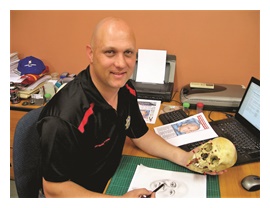Article by Kotie Geldenhuys; photos provided by the VIC
Victim identification is the process of determining the identity of a person who was killed in a disaster or a victim of a crime or to determine whether an unidentified body was that of a person who was reported as missing. Victim identification is also a process that helps families and friends find closure following the death of a loved one and is a vital aid during criminal investigations. Moreover, it is a fundamental human right for every individual to have a name and identity and to be treated with dignity and respect even in death.
Victim identification is an important, complex and often emotional process that requires skilled professionals with specialised training and expertise. In some cases, the identification process can take years or even decades. But advances in forensic technology have made it easier to identify unknown bodies and law enforcement agencies are increasingly using these tools to solve cold cases. In the aftermath of the Turkey and Syria earthquake during which more than 50 000 people died, Servamus visited South Africa's own experts who have the daunting task of identifying victims. We were curious to learn more about the range of forensic techniques they use during this process.
Establishing a Victim Identification Centre
In August 2011, the SAPS established the Victim Identification Centre (VIC) with only eight people, headed by Brig Leonie Ras as the Section Head. The reason for the establishment of this small and specialised section within the Forensic Science Laboratory (FSL) was to focus on missing persons and address the increasing number of unidentified bodies. It is not uncommon for the police to look for suspects without any success. There is a possibility that these suspects might be dead and lie unidentified in a mortuary facility. It is for this reason that members of the Post-mortem Sub-section of the VIC visit mortuaries to collect fingerprints and dental records from unidentified bodies, which are often badly decomposed. Despite the fact that a body is in an advanced stage of decomposition, fingerprints and dental records which are unique to each individual can still provide crucial evidence for identification purposes. The identification of unidentified bodies and remains can have a huge impact on unsolved or so-called cold cases.
Since the VIC's establishment, it has been involved in several large incidents such as the Lagos church collapse in Nigeria during 2014 and the tragic train disaster at Kroonstad in the Free State during January 2018. "I think South Africa is one of the leaders in Africa when it comes to the identification of victims," Brig Ras stated. She added that South Africa is an INTERPOL member country which means that the VIC has adopted measures to foster cooperation in Disaster Victim Identification (DVI) efforts to ensure accurate identification.
disaster at Kroonstad in the Free State during January 2018. "I think South Africa is one of the leaders in Africa when it comes to the identification of victims," Brig Ras stated. She added that South Africa is an INTERPOL member country which means that the VIC has adopted measures to foster cooperation in Disaster Victim Identification (DVI) efforts to ensure accurate identification.
The VIC has grown with a staff complement of just more than 60 members who operate from Pretoria and Cape Town. Brig Ras confirmed that the SAPS is in the process of decentralising offices in the Eastern Cape and KwaZulu-Natal and to extend these services to other provinces in future. At this stage the VIC in the Western Cape deals mainly with cases from the Western and Eastern Cape, while Head Office in Pretoria works nationwide.
The VIC consists of four different sub-sections:
- The Data Reconstruction sub-section deals with DNA analysis and is headed by Col K E Maswime;
- The Post-mortem Data Collection sub-section is headed by Col I G van der Nest;
- The Ante-mortem Data Collection sub-section is headed by Col H A Samaad; and
- The Specialised Identification Services (SIS) sub-section is headed by Col L Z Rossouw. SIS includes the specialist fields of Forensic Anthropology, Forensic Entomology and Facial Reconstruction.
******************************
[This is only an extract of an article that is published in Servamus: April 2023. The rest of the article discusses the work of these different sub-sections and the important work that they do. If you are interested in reading more, send an e-mail to: This email address is being protected from spambots. You need JavaScript enabled to view it. or a WhatsApp to: 078 712 1745 to find out what you have to do. Ed.]